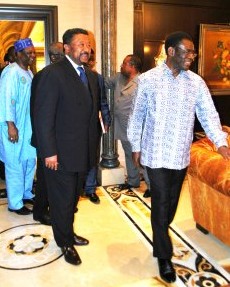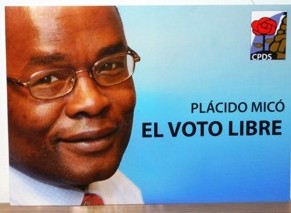|
Africa | Equatorial Guinea Politics | Human rights New AU leader Obiang calls criticism un-African
President Obiang, holding a brutal grip on power in Equatorial Guinea since 1978, this weekend was elected the new Chairman of the AU. The decision caused outrage among human rights groups world-wide, but also in Africa, with reference to Mr Obiang's very poor human rights record.
Indeed, Mr Obiang had focused on "African values" in his speech, as the Equatoguinean Presidency communicated through its exclusive Washington communication firm Qorvis yesterday. "The crisis of the values of the African culture is reducing the unity and solidarity among our people," he said at the summit, adding several times that Africa should not accept outside interference on the continent. The government spokesman's reply goes on praising President Obiang's popularity in Equatorial Guinea and the great progress made under his rule. President Obiang not only was "a loved leader in his country," but also "especially valued and recognised" in the Central African region. President Obiang, it was learnt, had "excellent relations" with countries all over Africa. "Proof to this is the support which President Obiang .. received form all African countries and other world regions during the polemics created by some few Western groups surrounding the issue of the UNESCO prize." Indeed, the UNESCO prize controversy last year was a major diplomatic setback for Mr Obiang. However, the protests against UNESCO accepting his prize money were mainly driven from African civil society groups. South African Archbishop Desmond Tutu headed the international campaign against the Equatoguinean Dictator. Government spokesman Osa finally pointed out that the election of President Obiang as AU Chairman had "been by majority and was totally lacking any type of polemics." Africa was behind him, the government message was. Meanwhile, however, AU officials have been quick to downplay the same election, following the outrage. AU Commission chief Jean Ping emphasised that "it was the turn of the Central African region" to lead the Union. "Rules are binding upon us," Mr Ping further pointed out, explaining why the Central African region's candidate had to be accepted. By Rainer Chr. Hennig © afrol News - Create an e-mail alert for Africa news - Create an e-mail alert for Equatorial Guinea news - Create an e-mail alert for Politics news - Create an e-mail alert for Human rights news
On the Afrol News front page now
|
front page
| news
| countries
| archive
| currencies
| news alerts login
| about afrol News
| contact
| advertise
| español
©
afrol News.
Reproducing or buying afrol News' articles.
You can contact us at mail@afrol.com









